三级英语语法重点-动词时态
大学英语三级语法知识总结汇总
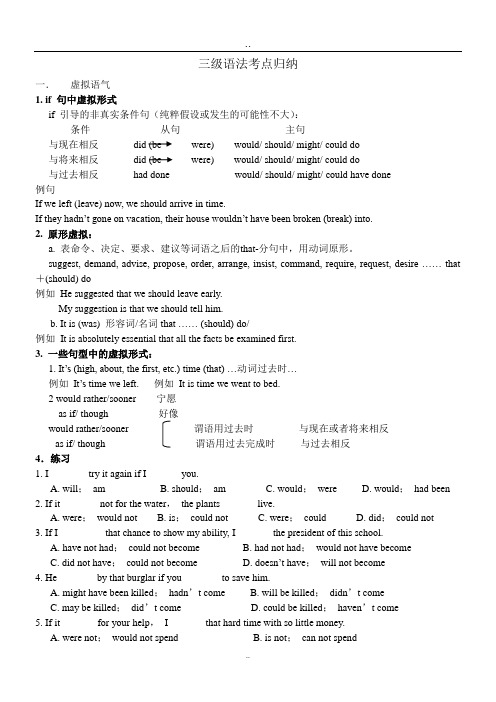
三级语法考点归纳一.虚拟语气1. if 句中虚拟形式if 引导的非真实条件句(纯粹假设或发生的可能性不大):条件从句主句与现在相反did (be were) would/ should/ might/ could do与将来相反did (be were) would/ should/ might/ could do与过去相反had done would/ should/ might/ could have done例句If we left (leave) now, we should arrive in time.If they hadn’t gone on vacation, their house wouldn’t have been broken (break) into.2. 原形虚拟:a. 表命令、决定、要求、建议等词语之后的that-分句中,用动词原形。
suggest, demand, advise, pr opose, order, arrange, insist, command, require, request, desire …… that +(should) do例如He suggested that we should leave early.My suggestion is that we should tell him.b. It is (was) 形容词/名词that …… (should) do/例如It is absolutely essential that all the facts be examined first.3. 一些句型中的虚拟形式:1. It’s (high, about, the first, etc.) time (that) …动词过去时…例如It’s time we left.例如It is time we went to bed.2 would rather/sooner 宁愿as if/ though 好像would rather/sooner 谓语用过去时与现在或者将来相反as if/ though 谓语用过去完成时与过去相反4.练习1. I _______ try it again if I_______you.A. will;amB. should;amC. would;wereD. would;had been2. If it _______ not for the water,the plants _______live.A. were;would notB. is;could notC. were;couldD. did;could not3. If I _______ that chance to show my ability, I _______the president of this school.A. have not had;could not becomeB. had not had;would not have becomeC. did not have;could not becomeD. doesn’t have;will not become4. He _______ by that burglar if you _______ to save him.A. might have been killed;hadn’t comeB. will be killed;didn’t comeC. may be killed;did’t comeD. could be killed;haven’t come5. If it _______for your help,I _______that hard time with so little money.A. were not;would not spendB. is not;can not spendC. had not been;would not have spentD. have not been;will not spend6. Where _______ you go if war _______?A. will;breaks outB. do;will break outC. would;were to break outD. will;is to break out7. She wishes she _______ that humiliating thing.A. doesn’t doB. didn’t doC. haven’t doneD. hadn’t done8. The chairman suggested that the meeting _______ put off.A. can beB. beC. isD. will be9. It is vital that he _______ immediately.A. should goB. must goC. goesD. went10. It is time we _______do our homework.A. begin toB. can begin toC. began toD. will begin to答案:1.选C。
高中英语语法--动词时态讲解及练习

高三英语语法复习:动词时态讲解动词的时态基本框架:动词时态综述:一、一般现在时表示持久存在的动作或状态,或现在的一段时间内经常发生的动作或存在的状态。
1.一般现在时的构成如果主语是第一人称、第二人称和第三人称复数,由行为动词的原形构成;如果主语是第三人称单数,行为动词要变为第三人称单数形式。
一般现在时的标志性词:①表示经常性、习惯性的动作,常与often,usually,always,sometimes,every day等时间状语连用。
I enjoy swimming, a lot and I love diving.我很喜欢游泳,也很喜欢潜水。
①表示现在的特征或状态。
The shop is open eight hours a day.这家商店每天经营8小时。
Many Chinese young kids are quite familiar with McDonald’s but know little about Peking Opera.许多中国小孩非常熟悉麦当劳,对京剧却知之甚少。
①表示客观事实和普遍真理。
Too much carbon dioxide pollutes the atmosphere.太多的二氧化碳污染了大气层。
Quality comes before quantity.质量重于数量。
(客观真理)(2)表示按时间表、规定、计划或安排将要发生的动作,常用be,go,arrive,leave,start,stay,begin等短暂性动词。
Hurry up!Our class begins at 8 o’clock. There is only 5 minutes left.快点儿,我们8点开始上课。
还剩5分钟了。
The plane leaves at three sharp.飞机3点整起飞。
(3)在时间、条件、方式、让步状语从句中表示将来的动作。
Our guides will have guns with them to scare the animals away if they come too close.如果那些动物靠的太近的话,我们的导游会带上枪来吓跑它们。
动词时态与语态总结

动词时态与语态总结动词时态和语态是英语语法中的重要概念,准确运用时态和语态可以使语言更加准确、流畅。
本文将对动词时态和语态进行总结和归纳,帮助读者更好地掌握这方面的知识。
一、动词时态1. 一般现在时(Simple Present Tense)一般现在时表示经常性、习惯性或普遍真理的动作或状态。
句子结构为主语+动词原形。
Example: She dances every evening.(她每天晚上跳舞。
)2. 一般过去时(Simple Past Tense)一般过去时表示过去发生的动作或状态。
句子结构为主语+动词过去式。
Example: They went to the park yesterday.(昨天他们去了公园。
)3. 一般将来时(Simple Future Tense)一般将来时表示将来发生的动作或状态。
句子结构为主语+will/shall+动词原形。
Example: I will travel to London next week.(我下周将去伦敦。
)4. 现在进行时(Present Continuous Tense)现在进行时表示现在正在进行的动作。
句子结构为主语+be动词+动词-ing形式。
Example: She is studying at the library.(她正在图书馆学习。
)5. 过去进行时(Past Continuous Tense)过去进行时表示过去某个时间正在进行的动作。
句子结构为主语+was/were+动词-ing形式。
Example: They were having dinner when the phone rang.(电话响时,他们正在吃晚饭。
)6. 将来进行时(Future Continuous Tense)将来进行时表示将来某个时间正在进行的动作。
句子结构为主语+will/shall+be+动词-ing形式。
Example: We will be waiting for you at the airport tomorrow.(明天我们将在机场等你。
高中英语语法复习讲义+训练:动词的时态(含答案)

中学英语语法复习讲义——动词的时态一. 概念:时态是英语谓语动词的一种形式,表示动作发生的时间和所处的状态.英语中的时态是通过动词形式本身的变更来实现的.英语有16种时态,但中学阶段较常用的有十种:一般现在时,一般过去时,一般将来时,过去将来时,现在进行时,过去进行时,将来进行时,过去完成时,英在完成时和现在完成进行时.二.相关学问点精讲1.一般现在时的用法1) 常常性或习惯性的动作,常与表示频腮度的时间状语连用。
时间状语:every…, sometimes,at…, on Sunday。
例如:I leave home for school at 7 every morning. 每天早上我七点离开家。
2) 客观真理,客观存在,科学事实。
例如:The earth moves around the sun. 地球绕太阳转动。
Shanghai lies in the east of China. 上海位于中国东部。
3) 表示格言或警句。
例如:Pride goes before a fall.骄者必败。
留意:此用法假如出现在宾语从句中,即使主句是过去时,从句谓语也要用一般现在时。
例:Columbus proved that the earth is round. 哥伦布证明了地球是圆的。
4) 现在时刻的状态、实力、性格、特性。
例如:I don't want so much. 我不要那么多。
Ann writes good English but does not speak well. 安英语写得不错,讲的可不行。
比较:Now I put the sugar in the cup. 把糖放入杯子。
I am doing my homework now. 我正在做功课。
第一句用一般现在时,用于操作演示或指导说明的示范性动作,表示言行的瞬间动作。
其次句中的now是进行时的标记,表示正在进行的动作的客观状况,所以后句用一般现在时。
动词时态详解

动词时态详解动词时态是指动词表示的动作或状态所发生的时间。
在英语中,有多种不同的时态,每种时态都有其独特的用法和含义。
以下是对一些常见动词时态的详细解释:1. 现在时态 (Present Tense)- 一般现在时 (Simple Present): 用于表达经常性的动作、客观事实、普遍真理等。
- 现在进行时 (Present Continuous): 用于表示正在进行的动作。
- 现在完成时 (Present Perfect): 用于表示过去发生的动作与现在的关系,强调结果或经验。
- 现在完成进行时 (Present Perfect Continuous): 用于表示过去开始并一直持续到现在的动作。
2. 过去时态 (Past Tense)- 一般过去时 (Simple Past): 用于表达过去发生的动作或状态。
- 过去进行时 (Past Continuous): 用于表示过去某一时刻正在进行的动作。
- 过去完成时 (Past Perfect): 用于表示过去某一动作或状态在另一过去时间点之前发生。
- 过去完成进行时 (Past Perfect Continuous): 用于表示过去某一时间点之前已开始并持续到另一时间点的动作。
3. 将来时态 (Future Tense)- 一般将来时(Simple Future): 用于表示将来发生的动作或状态。
- 将来进行时 (Future Continuous): 用于表示将来某一时刻正在进行的动作。
- 将来完成时 (Future Perfect): 用于表示将来某一时间点之前已经完成的动作。
- 将来完成进行时 (Future Perfect Continuous): 用于表示将来某一时间点之前已开始并持续到另一时间点的动作。
以上是关于常见动词时态的简要说明。
对于每种时态,还有其他细节和规则需要进一步了解和掌握。
在使用动词时态时,确保根据具体语境和需要选择合适的时态,以便准确地表达你的意思。
英语语法:动 词 的 时 态 和 语 态

英语语法:动词的时态和语态语态和时态学习英语的两大基础,是构成英语句型的关键,掌握了它们就为学好英语打下了坚实的基础。
所以用时必须熟练而准确。
小编在这里整理了相关知识,快来学习学习吧!一、一般现在时1、表示经常发生的习惯性的、现在反复出现的动作或状态,常用的时间状语有:always,usually,seldom, sometimes, every day, now and then, once a week 等。
2、表示眼下或目前等现在时间所发生的动作或存在的状态,这种状态带有一定的持续性。
3、表示客观事实或普遍真理。
4、书报的标题,故事的叙述,小说、戏剧、电影等情节介绍,图片的说明。
5、时间表、时刻表、日程表、节目单、课程表等按规定将要发生的动作,只限于 go, arrive, leave, start, stay, return, begin, come 等动词。
6、在时间、条件、方式、让步状语从句中,表示将来的动作。
注意:一般现在时可以用于定语从句或宾语从句中表示将来。
7、用在某些表达中,表示现在正在发生的动作或存在的状态。
Here comes the bus!How it rains!二、一般过去时等1、表示在过去某一时间点发生的动作或所处的状态,与现在没有关系。
常用的时间状语有:yesterday, last night, at that time 等。
2、表示在过去某一段时间里反复出现的动作或状态,与现在没有关系。
3、用 used to do 或would do 表示过去经常或反复发生的动作。
4、有些情况发生的时间没清楚表明,但实际上是“刚才,刚刚”发生的,属于过去时间,应使用过去时态。
常见的有 I didn’t know…或 I forgot…等。
5、一般过去时可与 today, this week, this month 等时间状语连用。
三、一般将来时1、will/shall do(1)表示将来会出现的动作或状态。
高考英语语法重点知识点

高考英语语法重点知识点英语语法在高考中是一个非常重要的考点,掌握好语法知识对于学生取得好成绩至关重要。
本文将围绕高考英语语法重点知识点展开讨论,帮助学生更好地备考。
一、动词时态1. 一般现在时:表示经常性、习惯性或普遍真理等。
例句:I often go to the park on weekends.2. 一般过去时:表示过去某个时间或者经历。
例句:I watched a movie yesterday.3. 一般将来时:表示将来某个时间或者打算。
例句:I will visit my grandparents next weekend.4. 现在进行时:表示现在正在进行的动作。
例句:I am reading a book right now.5. 过去进行时:表示过去某个时间正在进行的动作。
例句:I was studying when she called me.6. 现在完成时:表示过去某个时间发生的动作对现在造成的影响。
例句:I have finished my homework.7. 过去完成时:表示过去某个时间发生的动作对过去某个时间造成的影响。
例句:They had already left when I arrived.二、名词1. 可数名词:表示分别可由一个或多个单独个体构成的事物。
例句:There are three apples on the table.2. 不可数名词:表示无法分为个体的事物,如液体、材料、抽象概念等。
例句:I need some water to drink.3. 特殊可数名词:表示只有一个的事物。
例句:The sun rises in the east.4. 复合名词:由两个或者更多个词构成的名词。
例句:She bought a birthday cake for her mother.三、代词1. 主格代词:用于句子的主语位置。
例句:He is my brother.2. 宾格代词:用于句子的宾语位置。
动词时态规则

动词时态规则动词时态是指动词在不同时间点所表示的动作或状态的形式。
根据英语语法规则,动词时态分为以下几种:一般现在时、一般过去时、一般将来时、现在进行时、过去进行时、将来进行时、现在完成时、过去完成时、将来完成时、现在完成进行时、过去完成进行时、将来完成进行时等。
本文将介绍这些动词时态的规则以及其用法。
一、一般现在时 (Simple Present Tense)一般现在时表示经常发生或普遍存在的动作、状态或观点。
一般现在时的构成为:主语 + 动词原形。
1. 行为动词的一般现在时:a. 第三人称单数主语,动词要加-s或-es。
例如:He plays football every Sunday.(他每个星期天踢足球。
)b. 非第三人称单数主语,动词使用原形。
例如:I like to read books.(我喜欢读书。
)2. 非行为动词(状态动词)的一般现在时:非行为动词指表示状态,感官或存在等的动词。
在一般现在时中,它们保持不变。
例如:She feels happy when she sings.(她唱歌时感到非常快乐。
)二、一般过去时 (Simple Past Tense)一般过去时表示过去发生的具体动作、状态或习惯动作。
一般过去时的构成为:主语 + 动词过去式。
1. 行为动词的一般过去时:a. 所有人称主语,动词使用过去式。
例如:They watched a movie last night.(他们昨晚看了一部电影。
)b. 动词过去式为不规则动词的规则形式。
例如:She went to school yesterday.(她昨天去上学了。
)2. 非行为动词(状态动词)的一般过去时:非行为动词在一般过去时中,仍保持不变。
例如:I knew the answer to the question.(我知道问题的答案。
)三、一般将来时 (Simple Future Tense)一般将来时表示将要发生的动作、事件或存在的状态。
英语语法★动词时态-超级经典
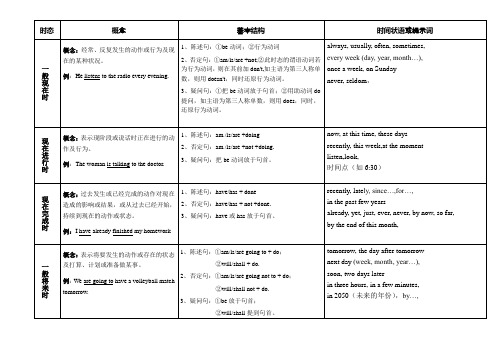
概念:表示将要发生的动作或存在的状态及打算、计划或准备做某事。
例:Weare going tohave a volleyball match tomorrow.
1、陈述句:①am/is/are going to + do;
②will/shall + do.
2、否定句:①am/is/are going not to + do;
recently, this week,at the moment
listen,look,
时间点(如6:30)
现在完成时
概念:过去发生或已经完成的动作对现在造成的影响或结果,或从过去已经开始,持续到现在的动作或状态。
例:Ihavealreadyfinishedmy homework
1、陈述句:have/has + done
once upon a time, the other day, two months ago,
when, after, as soon as引导的时间状语从句,表示主句动作开始的时间。
过去进行时
概念:表示过去某段时间或某一时刻正在发生或进行的行为或动作。
例:Wewere copyingthe new words this time yesterday.
时态
概念
基本结构
时间状语或提示词
一般现在时
概念:经常、反复发生的动作或行为及现在的某种状况。
例:Helistensto the radio every evening.
1、陈述句:①be动词;②行为动词
2、否定句:①am/is/are +not;②此时态的谓语动词若为行为动词,则在其前加don't,如主语为第三人称单数,则用doesn't,同时还原行为动词。
英语三级语法汇总
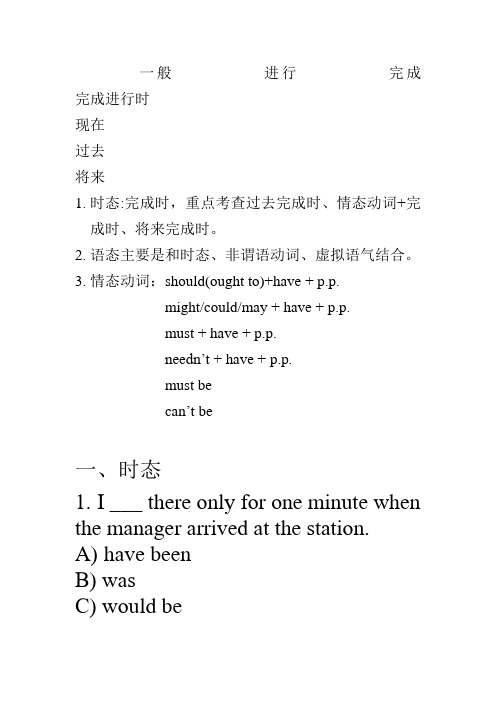
一般进行完成完成进行时现在过去将来1.时态:完成时,重点考查过去完成时、情态动词+完成时、将来完成时。
2.语态主要是和时态、非谓语动词、虚拟语气结合。
3.情态动词:should(ought to)+have + p.p.might/could/may + have + p.p.must + have + p.p.needn’t + have + p.p.must becan’t be一、时态1.I ___ there only for one minute when the manager arrived at the station.A)have beenB) wasC) would beD) had been2.By the time I got to the cinema, all the tickets for “The Merchant of Venice”____ out.A)were soldB)B) was soldC) had been soldD) have been sold3. When she arrived, I felt very bored and disappointed, because I _____ since seven o’clock.A. had waitedB) had been waitingC) were waitingD) have been waited4. My wallet is nowhere to be found. I ___when I was on the bus.A. must have dropped itB. must drop itC. should have dropped itD. have dropped it5. Just as I was leaving the house , it occurred to me that I ____to take my keys . (200406-30)A. should have forgottenB . have forgottenC. had forgottenD. must have forgotten6. They bought their first house last year , previously they _____to get a loan. (200306-21)A. were ableB. weren’t ableC. had been ableD. hadn‘t been able7. By the time we arrive in London, we___in Europe for two weeks. (200406-19)A. shall stayB. have stayedC. will have stayedD. have been staying8. Marie is very wet. She ______ in the river.A. can have fallenB. had to fallC. must have fallenD. needn’t to fall9. With all this work on hand, he ______ to the cinema last night.A. mustn’t goB. wouldn’t goC. ought to goD. shouldn’t have gone10. –Did you blame him for his carelessness?-Yes, but I _______ so.A.‘d rather not doB. shouldn’t doC. ‘d better not have doneD. shouldn’t have done11. “Did Ken take the job in the bookstore?”“No, but I think he ______.”A. will haveB. may haveC. should haveD. must have12. He _______ more than thirty.A. mustn’t beB. shouldn’t beC. won’t beD. can’t be13. You’re right. I _______ of that.A. should thinkB. should have thoughtC. must have thoughtD. needn’t think14. As we can’t get there in time, they ______ about our safety.A. should be worryingB. can be worryingC. must be worryingD. need be worrying15. I have already know about you; you ______ yourself to me.A. shouldn’t have introducedB. needn’t have introducedC. wouldn’t introduceD. mustn’t introduce16. Since my wife isn’t answering her telephone, she ________.A. must have leftB. should have leftC. can have leftD. need have left17. Since the ditch is full of water, it______ hard last night.A. ought to rainB. must have rainedC. might have rainedD. could rain18. Next month they_____ in the United States for thirty years.A. areB. have beenC. will beD. will have been19. It _______ for a week and the street were floodedA. has rainedB. had been rainingC. was rainingD. rained20. He was caught in a traffic jam and by the time he reached the airport his friend’s plane______.A. has already taken offB. had already taken offC. has been taken offD. had been taken off21. They told us that they _______ for more than two hours.A. have waitedB. were waitingC. have been waitingD. had been waiting22. It’s been a long time since I_______. How are you?A. had last seen youB. saw you lastC. have last seen youD. last was seeing you23. You needn’t hurry her. She ______ it by the time you are ready.A. will have been finishingB. will finishC. will have finishedD. will be finishing25. -“I have our tickets.”-“That’s good. I was afraid that you ______ them.”A. had forgottenB. forgotC. have forgottenD. are forgetting26. She said that she ______ soon.A. will go to collegeB. went to collegeC. would go to collegeD. won’t to go to college27. Last night he went to bed early. When we got there, he ______ to bed already.A. wentB. has goneC. had goneD. go二、非谓语动词(动名词、不定时、现在分词、过去分词<只有一种形式>)(doing/ to do/ doing/ done)(一般时、进行时、完成时)(主动、被动)1.英语中有些动词后面只能跟动名词作它的宾语。
2023年中考英语语法---动词时态专项复习知识点

2023年中考英语语法---动词时态专项复习知识点一、动词的五种基本形式动词主要用来表示动作、状态和性质,而动作和状态的发生有具体的时间和表现方式,这就是英语中动词的时态。
英语中动词的时态由动词的不同形式来表示。
英语动词的五种基本形式为:动词原形、第三人称单数、现在分词、过去式和过去分词。
如:work—works—working—worked—worked。
常见六种时态的构成及用法(1)一般现在时用法:①现在经常性的状态或动作;②客观事实和真理。
构成:①be+表语;②实义动词作谓语标志词:often, sometimes, usually, always, never,twice a month, everyday/week/month/year(every系列)例句:He usually gets to school early.他通常很早到校。
The moon moves around the earth.月亮绕着地球转。
练一练1.认识从实践开始Knowledge practice.2.如果明天下雨,我们就不去公园了。
If it tomorrow,weto the park.【答案】1. begins with.2.rains,won’t go(2)一般过去时用法:表示过去的动作或状态。
构成:①was/were+表语;②实义动词作谓语标志词:a moment ago,just now,ago, yesterday, last night/week/month(last系列) 例句:We went to Yunnan last Monday.上周一我们去了云南。
1.She (not visit)her aunt last weekend.2.My friend,Lucy, (study)for the math test and(practice)English last night.【答案】1.didn’t visit 2.studied practiced(3)一般将来时用法:表示将来的动作或状态。
英语语法重点知识大汇总
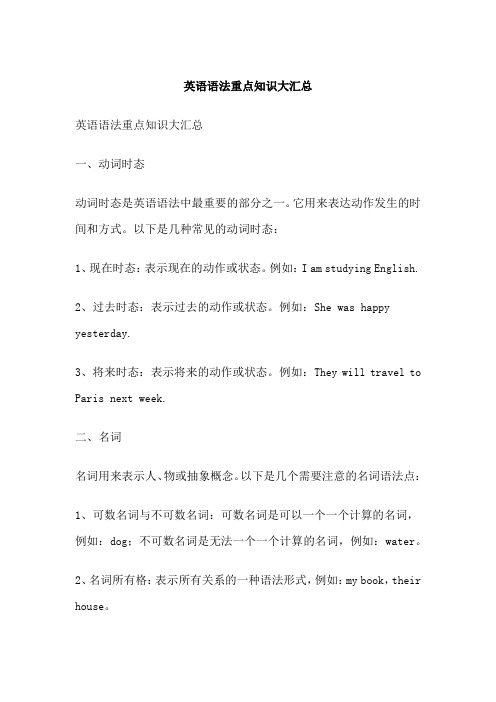
英语语法重点知识大汇总英语语法重点知识大汇总一、动词时态动词时态是英语语法中最重要的部分之一。
它用来表达动作发生的时间和方式。
以下是几种常见的动词时态:1、现在时态:表示现在的动作或状态。
例如:I am studying English.2、过去时态:表示过去的动作或状态。
例如:She was happy yesterday.3、将来时态:表示将来的动作或状态。
例如:They will travel to Paris next week.二、名词名词用来表示人、物或抽象概念。
以下是几个需要注意的名词语法点:1、可数名词与不可数名词:可数名词是可以一个一个计算的名词,例如:dog;不可数名词是无法一个一个计算的名词,例如:water。
2、名词所有格:表示所有关系的一种语法形式,例如:my book,their house。
三、形容词形容词用来描述人或物的特征。
以下是几个需要注意的形容词语法点:1、比较级和最高级:比较级表示“更……”的意思,最高级表示“最……”的意思。
例如:better,best。
2、形容词的位置:形容词一般放在名词前面,如:beautiful flower;但有时候也可以放在名词后面,如:flower beautiful。
四、副词副词用来描述动作或状态的特征。
以下是几个需要注意的副词语法点:1、副词的位置:副词一般放在动词前面,如:quickly run;但有时候也可以放在动词后面,如:run quickly。
2、副词的比较级和最高级:副词也有比较级和最高级,例如:faster,fastest。
五、从句从句是句子中的一个组成部分,它可以是一个完整的句子,也可以是一个短语或单词。
以下是几种常见的从句类型:1、名词性从句:用来代替名词的一种从句,例如:what he said is not important。
2、定语从句:用来修饰名词的一种从句,例如:the girl who is singing is my friend。
英语三级必考语法1

●●我不记得向你借过钱。
●Remember我忘了我见过他。
●Don’t forget●我后悔没有努力学英语.(regret—懊悔,studying表示发生在谓语动作之前.)●I regret我很抱歉不能和你一起去看电影。
(regret—抱歉,to say是指现在。
)1.You were brave enough to raise objections at the meeting。
--Well,now I regret _______ that。
A. to do B。
to be doing C. to have done D. having done1.D regret doing sth (或having done sth)=后悔做……。
Regret to do sth=抱歉或者遗憾做……。
我打算坐飞机去.(propose—打算,go there指自己去。
)●He proposes他建议坐飞机去.(propose—建议;going there是泛指;不见得是他本人.)在need,want,clean,require,to be worth等词后面跟动名词时,一般不用被动,用不定式需用被动。
as-—尽管as引导让步状语从句时,句子通常倒装。
可与though互换as——因为,通常放在句首。
情态动词一、“must do (be)” must be doing"表示对现在情况的推测“must have done (been)"表示对过去情况的推测.二、should/ought to “should/ought to have done (been)。
"表示过去应该做而没有做三、could “could have done(been)"表示过去时间里某个动作或某种情况本来能发生,但事实上并未发生。
四、had better和would rather,would sooner.。
英语语法重点解析

英语语法重点解析英语语法是学习英语过程中不可忽视的重要一环。
掌握英语语法可以帮助我们更准确、准确地表达自己的意思,避免语法错误。
而理解和掌握英语语法的关键在于重点解析,下面将详细探讨英语语法的几个重点。
一、动词时态动词时态是英语语法中最基础、最常用的部分。
正确使用动词时态可以准确描述过去、现在和将来的动作。
下面是几个常用的动词时态:1. 现在时态:用于描述当前正在发生或经常发生的动作。
例如,“I study English every day.”(我每天学习英语)2. 过去时态:用于描述已经发生的动作。
例如,“He visited his friend last week.”(他上周去拜访了他的朋友)3. 将来时态:用于描述将要发生的动作。
例如,“They will go to the park tomorrow.”(他们明天会去公园)二、名词和代词名词和代词在英语语法中也是十分重要的一部分。
名词用于指代人、事物或概念,而代词则用于代替名词。
下面是一些名词和代词的重点解析:1. 可数名词和不可数名词:可数名词可以数,而不可数名词无法数。
例如,“book”(书)是可数名词,“water”(水)是不可数名词。
2. 人称代词:人称代词用于代替人称,包括第一人称、第二人称和第三人称。
例如,“I”(我)是第一人称代词,“you”(你)是第二人称代词,“he”(他)是第三人称代词。
三、介词和连词介词和连词在句子中起到连接的作用,帮助句子更流畅地表达。
下面是一些常见的介词和连词:1. 介词:介词用于表示位置、时间、原因等,常与名词、代词或动词搭配使用。
例如,“in”(在)表示位置,“on”(在...上)表示位置,“for”(为了)表示目的。
2. 连词:连词用于连接句子、短语或单词,使句子更连贯。
例如,“and”(和)用于连接并列的词或句子,“but”(但是)用于连结对立或相反的词或句子。
四、形容词和副词形容词和副词用于描述名词、代词和动词。
英语语法动词的时态与语态
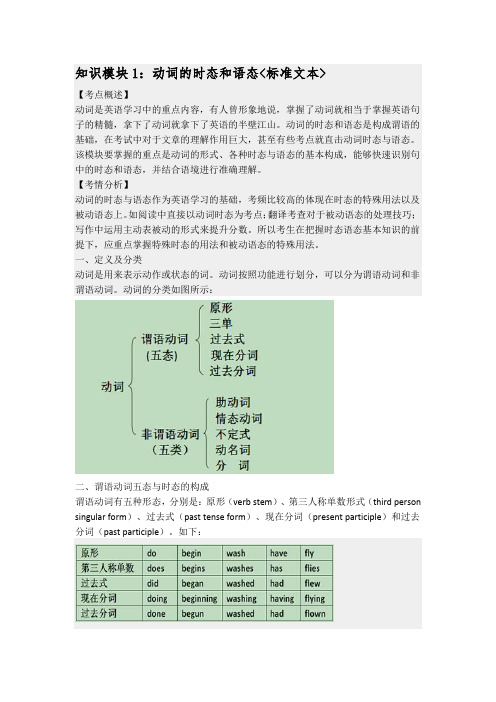
知识模块1:动词的时态和语态<标准文本>【考点概述】动词是英语学习中的重点内容,有人曾形象地说,掌握了动词就相当于掌握英语句子的精髓,拿下了动词就拿下了英语的半壁江山。
动词的时态和语态是构成谓语的基础,在考试中对于文章的理解作用巨大,甚至有些考点就直击动词时态与语态。
该模块要掌握的重点是动词的形式、各种时态与语态的基本构成,能够快速识别句中的时态和语态,并结合语境进行准确理解。
【考情分析】动词的时态与语态作为英语学习的基础,考频比较高的体现在时态的特殊用法以及被动语态上。
如阅读中直接以动词时态为考点;翻译考查对于被动语态的处理技巧;写作中运用主动表被动的形式来提升分数。
所以考生在把握时态语态基本知识的前提下,应重点掌握特殊时态的用法和被动语态的特殊用法。
一、定义及分类动词是用来表示动作或状态的词。
动词按照功能进行划分,可以分为谓语动词和非谓语动词。
动词的分类如图所示:二、谓语动词五态与时态的构成谓语动词有五种形态,分别是:原形(verb stem)、第三人称单数形式(third person singular form)、过去式(past tense form)、现在分词(present participle)和过去分词(past participle)。
如下:(一)谓语动词五态与时态相对应(如下图)所以,我们判断一个句子是什么时态时,只需把其谓语动词找出来,并判断其是五态中的哪一个,然后写上对应的汉字,即可快速判断该句话的时态。
例1:I have been being a teacher since 2004.(现在完成进行时)自从2004年起我一直做老师。
例2:I will have finished the task by 2 o’clock tomorrow.(将来完成时)我明天2点会完成任务。
(二)动词过去式与过去分词的构成规则1.规则变化⑴一般在动词原形后加-ed,如:betray-betrayed,oppress-oppressed(压迫)。
时态、动词语法

时态、动词语法
时态是英语语法中非常重要的概念,它用来表示动作或状态发生的时间。
在小学阶段,学生通常需要掌握的基本英语时态有以下四种:
一般现在时(Simple Present Tense):用于描述习惯性动作、事实、真理或经常性的行为。
例句:I study English every day. (我每天学习英语。
)现在进行时(Present Continuous Tense):用于描述正在进行的动作或现阶段内持续的动作。
例句:We are playing football now. (我们现在正在踢足球。
)
一般过去时(Simple Past Tense):用于描述过去某个时间发生的动作或存在的状态。
例句:Yesterday, I went to the park. (昨天我去公园了。
)过去进行时(Past Continuous Tense):表示过去某段时间内一直在进行的动作。
例句:At that time, they were watching a movie. (那个时候,他们正在看电影。
)
动词根据不同的时态会有相应的变化形式,包括:
动词原形(Infinitive)
第三人称单数形式(如:play →plays)
过去式(如:play →played)
过去分词(如:play →played)
现在分词(如:play →playing)
除了这四大基础时态外,随着年级的升高,学生还会接触到更多的时态,例如将来时(Future Tense)、完成时态(Perfect Tenses)等。
对于小学生来说,理解并熟练运用这些基本时态对于建立良好的语言基础至关重要。
- 1、下载文档前请自行甄别文档内容的完整性,平台不提供额外的编辑、内容补充、找答案等附加服务。
- 2、"仅部分预览"的文档,不可在线预览部分如存在完整性等问题,可反馈申请退款(可完整预览的文档不适用该条件!)。
- 3、如文档侵犯您的权益,请联系客服反馈,我们会尽快为您处理(人工客服工作时间:9:00-18:30)。
三级英语语法重点第一节动词的时态:讲12种特别关注:1、一般现在时的特殊用法;2、一般过去时;3、过去进行时4、现在完成时5、过去完成时;6、将来完成时;7、现在完成进行完成时;8、过去完成进行时。
一、一般现在式:特殊用法:在时间状语、条件状语从句(if, unless)中表示将来的动作:A.时间状语(before, after, until, as soon as, when):They will go home for winter vocation as soon as they finish their exams.When the mixture is heated , it will give off a powerful force.34.”When are you going to visit your uncle in Chicago?”“As soon as we complete our work for tomorrow.” (03/11试A)B.条件状语(if, unless):We’ll go fishing if weather is good tomorrow.I can’t go to your birthday party unless my father agrees. 除非我爸爸同意,否则我去不了你的生日会(2000年试题)二、一般过去时:(要掌握常用不规则动词的过去式及过去分词形式,40个左右)1、简单陈述过去的动作或状态:would doI would go swimming when I was a child.2、used to do sth 过去常常做(现在不做了);be used to doing 习惯于做……(现在还在做)We used to swim in the river when we were in the countryside.我们过去常在河里游泳。
(现在不了)The old man is used to getting up early in the morning. 老人习惯早起。
3、It is …time since +从句引导的时间状语从句中, since后谓语动词用一般过去时(自从…以来)54. No one can possibly recall any detail about the meeting. It is at least five years since it C. took place . (02年A卷)三、一般将来时1、will(shall)+原形动词:表示将来的动作或状态。
例:He will come and help you. 他会来帮助你的。
2、be going to +动词原形:表示马上就要发生的事情或打算好要做的事。
例:Are you going to attend the lecture? 你打算去听这个演讲吗?3、be to +动词原形:强调按安排或计划\命令要求\命中注定的动作The Third-Ring Road is to be open to traffic before National Day.三环路将在国庆节前通车。
You are to do your homework. 你必须先做作业。
Your plan is to fail. 你的计划注定失败。
4、用某些动词的现在进行时表达根据计划、安排而将于近期(将来)发生的事情,代表动词:go ,come, start, stop, arrive, leave等We are leaving for Beijing tomorrow. 我们明天动身去北京。
5、一般现在时表示将来(见前一、一般现在时)四、现在进行时1、表示说话时(现阶段)正在进行的动作。
The teacher is talking with his students. 这位老师正在同他的学生交谈表示现阶段正在进行的动作,但此刻并不一定在进行。
I am attending a conference in Beijing. 我正在北京参加一个会议。
2、表示经常或反复发生的动作,但往往带有欣赏、厌恶等的感情色彩He is always thinking of others first. 他总是先为别人着想。
(欣赏)Why are you always leaving things behind. 你怎么总是丢三落四的。
(厌恶) 3、描述某人一时的表现,通常用动词be 的进行时态She is being friendly today. 她今天很友善。
(平时不这样)五、过去进行时 was/were doing表示在过去某一段时间正在进行的动作。
常需用表示过去的时间状语或通过上下文来判断时间。
I fell and hurt myself while I _______ tennis. A. was playing(98年43题)重点:when 和while 的区别when 表示时间上的点,引导的句子用一般过去时while 表示持续的一段时间,引导的句子用过去进行时六、现在完成时have/has done(过去分词)1、表示过去到现在这段时间完成并对现在有影响的动作或状态,常和just, already, so far, yet, up to now, up to the present, recently, lately, in the past few years 连用。
I have seen the film. 我看过这个电影。
(我了解电影的内容)2、表示过去开始一直延续到现在的动作、状态、经历或习惯等,通常和延续性动词连用:stay, study, live, to be, teach, work …, 常用since,even since引导的短语或从句,或由for 引导的短语连用。
He has lived here for 30 years. 他住在这儿已经三十年了(现在还住在这儿)Have you even been to Tibet? 你去过西藏吗?3、固定句式:it is the first/second/last time that +延续性动词过去完成时It is the third time that I have been to Beijing. 那是我第一次到北京。
比较:It is 3 years since I left Shanghai .我离开上海已经三年了。
4、现在完成时和一般过去时Jone has lived Landon for 10 years. 现在还住Jone lived Landon from 1998-2000. 曾经住,现在不在了七、过去完成时 had done1、表示在过去的某一时刻或动作之前已经完成了的动作(即过去的过去)。
可用by, until, before, after, when等介词或连词引导的短语或从句表示。
When I arrived he had left. 我到那他刚走40、When I went to visit Mrs.Smith last week, I was told she _______ 2 days before. D. had left (0311试A)2、没有时间状语时,时间先后由上下文表示:I didn’t know he had moved out.我不知道他已经搬家了3、特殊用法:(1)和before连用,表示“还没来得及…就…“She cried before I had realized what was happening.我还没明白怎么回事之前她就哭了(2)It was the first/second/last time that + 过去完成时It was the first time (that) they had tried foreign food.这是他们第一次吃西餐。
4、常用在no sooner …than…, hardly/scarcely/barely…when…,一…就…。
句型之中,句子到装。
I had no sooner returned than he called.= No sooner had I returned than he called.八、将来完成时:will/shall have done表示在将来某一时间以前已完成或发生的动作By the end of next month, he will have been here for 10 years.到下个月为止,他在这住了10年了24. I___writing the article by the time you get.D.shall have finished (2000年)30. By next year he ______ in New York for five years.A. will have worked (0411A)九、现在完成进行时:have/has been doing表示从过去某时一直延续到现在的动作We have been waiting for you for an hour.我们等了你一小时了。
( 动作到此为止,不持续下去)I have been learning English for 10 years.我学英语10年了。
(还要继续学下去)十、过去将来时:形式:would do 或was/were going to do表示相对于过去的将来,多见于间接引语出现在阅读或完型中He said that he would wash his car the next day.He said that he was going to wash his car the next day. 他说明天要洗车。
十一、过去完成进行时:had been doing表示过去某一时刻以前一直延续的的动作They had been waiting for an hour before the bus came.64. 改错。
Even though Sedat has been studying English for three years before he came to the United States , It is still difficult for him to express himself. (0304A)has been 改为had been十二、将来完成进行时:will/shall have been doing表示将来某一时刻以前一直进行的动作。
